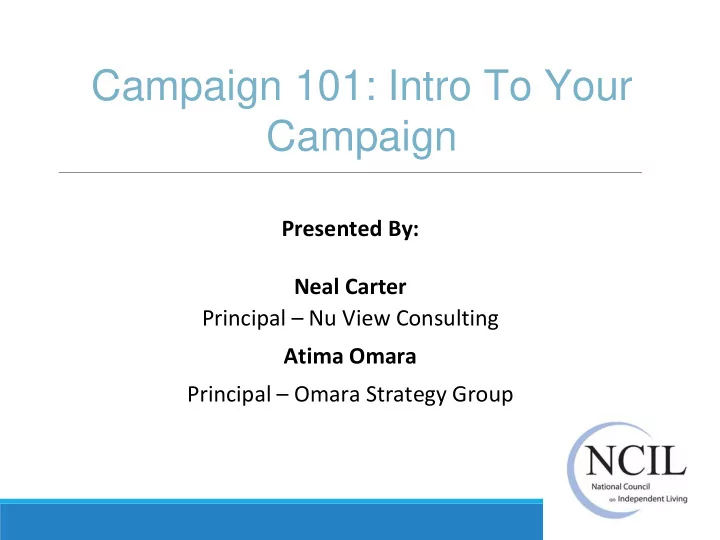

Campaign 101: Intro To Your Campaign Presented By: Neal Carter Principal – Nu View Consulting Atima Omara Principal – Omara Strategy Group
What We’re Going to Cover: ● Campaign Startup Checklist ○ Filing for Office Steps & Compliance ● Prepare with Family, Friends, & Work ● Campaign Messaging ● General Fundraising ● Building Campaign Team
Setting Up the Campaign Secretary of State/Commonwealth website has state and local rules for running How many signatures you need to get on the ballot Fundraising limits and rules on contributions (varies by state) Paperwork to form a legal campaign entity Federal Election Commission (FEC) for US Congress & US Senate include your Secretary of State/Commonwealth for supplemental paperwork Have Plan To Get On The Ballot When is the deadline to get on the ballot? Who will get your signatures? Turn in signatures to get on ballot ahead of deadline!
Setting Up The Campaign: Continued •Open a campaign bank account • Identify a campaign treasurer and a deputy treasurer •Hire a compliance firm Campaign finance experts who understand the constant changes to campaign finance and law you do not want an ethics complaint, extensive fines or jail time If you are on Social Security or Medicaid: talk to your local center on independent living or a lawyer about how this may impact your benefits.
Preparing Family, Friends, Work Set Expectations with Family & Friends ● Assess hours a day that you need to be focused on the campaign ● If you are a family caregiver or parent, have you worked out roles with family while campaigning? ● Have you spoken to immediate family members about what a campaign will mean to their lives? ● Asses your attendant care needs and how they could change based on a long campaign schedule Employment & Finances ● Have you figured out how you’ll navigate your job (if you work full time) ● If you own a business, have you figured out how to put it on hold?
Campaign Messaging Going into the cycle, there are two main questions that you need to have clear, quick answers to: 1. Why are you running? 2. What have you done for your community?
Your Story, Your Message What is your “why” for running? How did you come to be in the district? • Where have you worked? Volunteered? • What are the issues that, as a result of your life and work, you care about? How does your story tie into that of the district in which you are running? Answering these questions will define the candidate you will be. It will be the foundation of the campaign message.
Messaging Implementation Develop a Message Calendar ● Plan your outreach in advance and stick to the calendar ● Plan a different form of outreach each month of the year from now until Election Day ● Include outreach around current events (Veteran’s Day, Black History Month etc.)
Talking To Media ● Politics and press are both about relationships ● Be willing to talk off-the-record/on background to reporters about issues they are working on ● Local newspapers are most likely to write about your work ● Use community newsletters, public access TV, radio, and sometimes blogs ● Develop an email distribution list of all outlets in your area to whom you can easily disseminate information
Paid, Owned, and Earned Media: What’s the Difference?
Know The Media Basics ● Not all stories are created equally ● Press needs a hook ● Timeliness is critical. Press works in 12 hour cycles with 2 hour increments. ○ Return phone calls that day, preferably before 4:30 or 5pm (deadline) ○ Call back even if you miss that deadline to demonstrate responsiveness
Budgeting/Fundraising • Understand everything is going to cost money • Build your fundraising base from within your own network • Do not spend frivolously on unnecessary campaign expenses early • Utilize the fundraising base from within your own network • You do not have to be a millionaire or have a bunch of millionaire friends to raise money needed
Fundraising Basics We have to show we can raise the dollars to fund our campaign strategy execution. Even small-dollar donations can make the difference Map out your personal networks: 1. Personal: family, friends, co-workers, fellow school alum 2. Ideology: disability rights, pro -labor, LGBTQ+ 3. Anti- Opponent: folks who don’t like your opponent 4. Power Players: may give to you much later in the campaign Use Excel to compile contacts into neat lists for easy upload into a fundraising database like NGPVAN/L2
What does my campaign staff look like? OR
Locating Staff Staffing your campaign? These orgs can help: Inclusv NCIL Democratic Gain
Campaign Tools and Resources
Contact Information Neal Carter ncarter@nuviewconsulting.org Atima Omara atima@omarastrategy.com
Recommend
More recommend